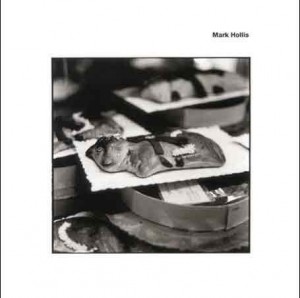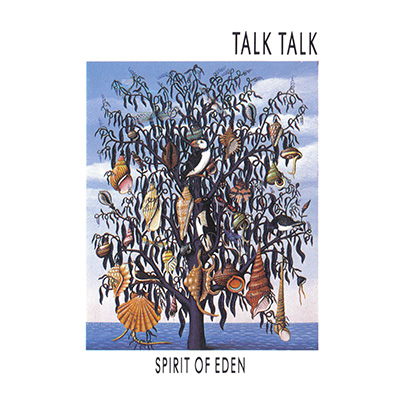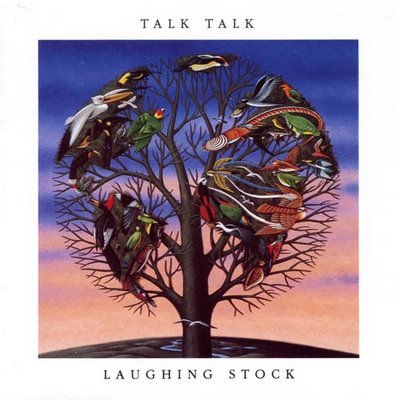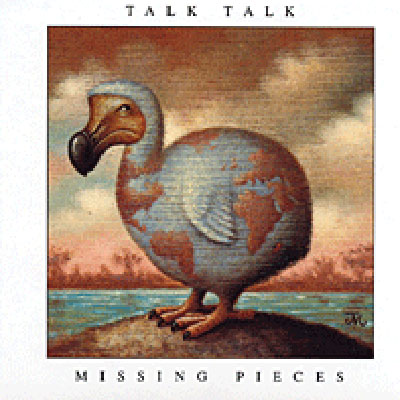“Although Dido has sold over 28 million records worldwide, I have never received a single telephone call from any record company or artist because of my involvement on those albums. In contrast, Talk Talk’s ‘Spirit of Eden,’ which was seen as a failure at the time of its release, has steadily brought me work for the past 20 years.” – Phill Brown, producer
Back in 1993, shortly after I became pals with Jessamine’s then-Krautrock-obsessed Rex Ritter, he made reference to his veneration of SPIRIT OF EDEN, the 1988 Talk Talk album that seems to have marked a sea change in style that neatly [or perhaps not so neatly] bifurcates the band’s odd career.
Anyhow, as I recalled "It’s My Life" and, more significantly, it’s predecessor video/single, "Talk Talk", from the all-night MTV marathons John Kappes and I occasionally undertook during the winter/spring of 1983, shortly after Missoula finally got it’s MTV, I found Rex’s near-hushed reverence for the band baffling in the extreme!
To me they were a 1.5 hit Brit synth pop wonder, a trifling sub-footnote to such superior examples of that ilk as ABC, Haircut 100, and my beloved A Flock of Seagulls! LOL
More like Kajagoogoo, actually, and certainly nothing for a visionary musical aesthete like the aforementioned Rex R. to be sullying himself with!
Anyhow, not too long after that, I somehow acquired a free, still-sealed copy of SPIRIT OF EDEN from the trash at my then-job in the warehouse of a Seattle music distributor. I dutifully put it on one night and was both baffled and delighted by the slow, hushed, very poignant delicacy of the music contained therein.
It was simple, desolate, intensely-if-obliquely personal, not unlike the stark, less-penetrable instrumental sections of The Cure’s dark grey Postpunk albums of 1980-81, FAITH and SEVENTEEN SECONDS. It also put me in mind of Nick Drake, whose cult I had joined about five years ahead of the curve.
The limpid, seemingly-dispassionate vocal delivery of Mark Hollis, who’d apparently hijacked Talk Talk from its hit-bound origins and jettisoned his bandmates in pursuit of lovely-if-depressive sound sculpture, was off-putting at first, but I soon became fond of using the album as a late-night calmative upon very specific occasions.
Its many orchestral flourishes/pretensions [hello, Nigel Kennedy on violin!] actually seemed apropos, if not organic/instrinsic to the music of Hollis’ lonely mind.
Like Mr. Kappes’ mid-1990s Goth faves Lycia, whose album COLD set a new standard for chilly, flanged desolation, this latter TT seemed to be most of all a form of music meant to accompany
Now, I’m a rocker, a punk, a LOUD GUITAR MAVEN, in general. I seldom bother much with miserabilism, or "bedroom pop", either, though I have come to adore The Felt, another eccentric, mid-1980s, post-Postpunk cult band, during the past decade or so.
And I’ve found this (very) other
When I started to read MOJO regularly, in about 1998, I discovered that they were promulgating a sort of "Cult of Mark Hollis", and that the critical consensus had shifted from SPIRIT OF EDEN to 1991’s final Talk Talk album, the below-mentioned LAUGHING STOCK, which I duly purchased. My memory is that it seemed less lush, and that any hint of hope had been extinguished, though the music retained a certain twee, undeniable beauty amidst the psychological wreckage.
It left me colder, as I’m sure was intended, so I would say that I only really admire
As the years went by, I began to find analogous artists here and there: Mark Kozelak of Red House Painters, increasingly; Bedhead; Low; the entire "Slowcore" movement, etc.
But to my knowledge no truly new Mark Hollis material has emerged since 1991, though a ca. 1986 live album did come out in 1999 for we semi-cultists to savor, and a pseudo-rarities disc called MISSING PIECES [containing the six cd-single tracks from LAUGHING STOCK, plus a 15-minute outtake called "Piano"!] appeared in 2001.
This much I feel I "know", but I hope others will feel free to sketch in more details, correcting or finessing my points of reference or interpretation, as I’m doing this strictly from memory, and haven’t listened to the albums in question for many years now.
– Tom Kipp
******************************************
 Glenn Mcdonald’s work lead me to late Talk Talk, for which I remain immensely thankful. He explains it better than I could. You’ll find his writings on Talk Talk and Mark Hollis’ solo album here:
Glenn Mcdonald’s work lead me to late Talk Talk, for which I remain immensely thankful. He explains it better than I could. You’ll find his writings on Talk Talk and Mark Hollis’ solo album here:
http://www.furia.com/page.cgi?type=twas&id=twas0109#entry2
http://www.furia.com/page.cgi?type=twas&id=twas0178#entry2
http://www.furia.com/page.cgi?type=twas&id=twas0215#entry3
http://www.furia.com/page.cgi?type=twas&id=twas0163#entry1
I suggest starting with that last one, actually. Beyond the (itself-worthy) meta-digression on music heads sitting head-to-head, you’ll find a fine outline of the Talk Talk phemonenon entire. The pull quote for those in a hurry:
 “…Spirit of Eden, the band’s 1988 fourth album, is another order of artistic accomplishment entirely, in my mind. It is the quietest record I would ever imagine identifying as rock music. The spaces between notes are as carefully articulated as the notes themselves; the sounds of fingers coming off strings are as important as the sounds of them going on; it is less an album of songs than a forty-one minute aural-Cubist magnification and refraction of the pooled essences of two dozen musicians sharing a room for a single reverent moment. No work of art has ever made me more sure that there is an animus in human lives that transcends physiology, because I could swear, when I’m listening to Spirit of Eden, that I can hear it whispering.”
“…Spirit of Eden, the band’s 1988 fourth album, is another order of artistic accomplishment entirely, in my mind. It is the quietest record I would ever imagine identifying as rock music. The spaces between notes are as carefully articulated as the notes themselves; the sounds of fingers coming off strings are as important as the sounds of them going on; it is less an album of songs than a forty-one minute aural-Cubist magnification and refraction of the pooled essences of two dozen musicians sharing a room for a single reverent moment. No work of art has ever made me more sure that there is an animus in human lives that transcends physiology, because I could swear, when I’m listening to Spirit of Eden, that I can hear it whispering.”
…as an added attraction, here’s “Crawdaddy!”‘s Andy Vietze on the Hollis solo album:
http://www.crawdaddy.com/index.php/2008/03/12/talk-talks-mark-hollis/
If anyone can definitively identify that…er…thing, on the cover, please let me know.
Best,
– Andrew Hamlin
******************************************
P.S. Thanks to Andy Hamlin for pointing out the eponymous 1998 Mark Hollis solo effort, which had quite entirely passed me by, as it apparently did all but his most fervent disciples. Love to hear it sometime….
– Tom Kipp
******************************************
I honestly do not mean this as sour grapes, but does anybody else think it odd that an article on a never-superstars group that broke up twenty years ago attracts several comments, whilst an article on Michael Jackson attracts none?
Of course, Michael doesn’t need people to be won over to his music…
– Andrew Hamlin
******************************************
Just the Nature of Cultdom, Andy, as you well know. And of course the self-selective nature of EPB‘s core audience plays a role as well.
The arcane and unusual attract the pointyhead folk like ourselves. And MJ’s fanbase simply never contained many of those, aside from the professional rockcrit class who got/get paid to speculate/navel gaze about "his continuing appeal for his global fanbase, rackarackaracka…."
I’m convinced that folks who love obscure music like the latter Talk Talk albums forge intensely personal relationships with these records in part because there is simply seldom [or never] anyone with whom they can actually discuss them!
Emotional and intellectual pressure builds and is never released, whereas a Michael Jackson fan can shoot his/her conversational "load" every time he/she turns around, even [or perhaps especially!] now.
The internet has mitigated this a little, but those message board exchanges are still no substitute for impassioned, in-person conversation!
It’s a shame we’re moving further away from such regular interactions, at the societal level. And that, due to the atomization of individual lives and the endless choices presented by 21st Century Corporate Entertainment, a repetition of the sort of critical/mass consensus that MJ represented has become exceedingly unlikely, if not outright impossible to achieve, Justin Bieber notwithstanding!
– Tom Kipp
******************************************
******************************************
.
Behold! Ace engineer Phill Brown spills the beans on how those three legendary albums got made (at the expense of his sanity, natch).
Consult the “Artist List” for appropriate wow-age.
Pull quote (from the last page of narrative): “Although Dido has sold over 28 million records worldwide, I have never received a single telephone call from any record company or artist because of my involvement on those albums. In contrast, Talk Talk’s ‘Spirit of Eden,’ which was seen as a failure at the time of its release, has steadily brought me work for the past 20 years.”
…and since Tom remarked that he hadn’t heard the Mark Hollis solo album (probably his Hollis swan song), I enclose a few clips for enlightenment:
– Andrew Hamlin
******************************************
Hi Andy:
Thanks for sharing the Phill Brown bio excerpts. His ongoing series of interviews was always one of my favorite elements of TAPE/OP, back when I had a free subscription!
And I did p/u the Hollis solo album not long after our initial EPB discussion. Songs haven’t sunk in yet, but I’ll always give him a year or two, given the subtle ways in which he works his magic.
– Tom Kipp





